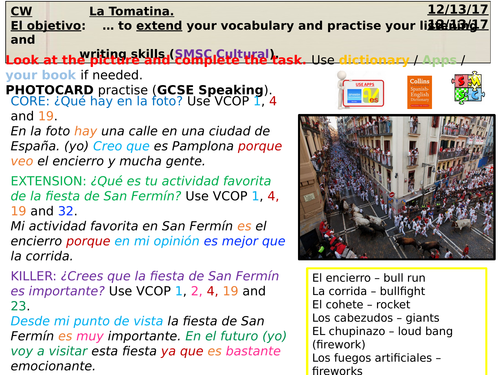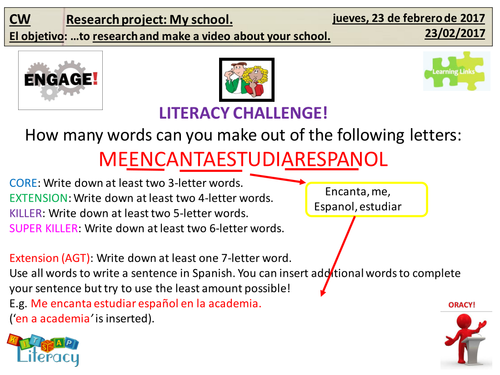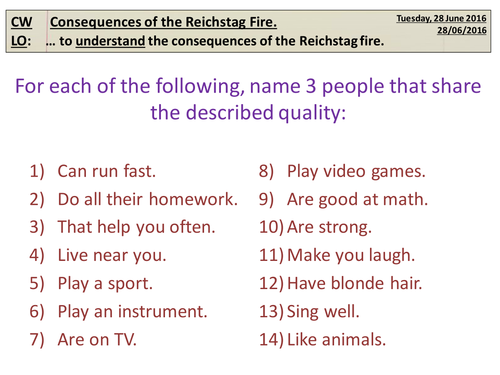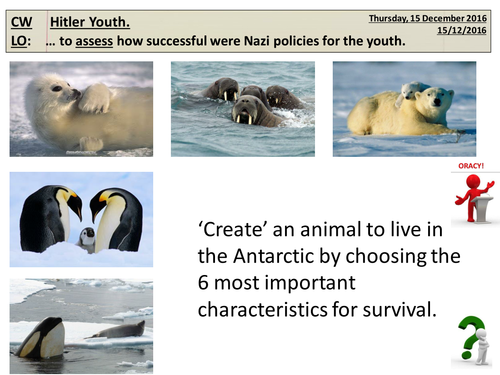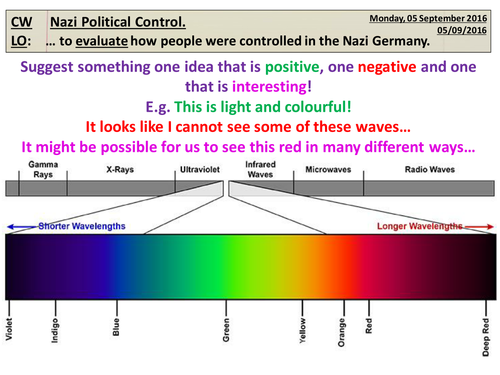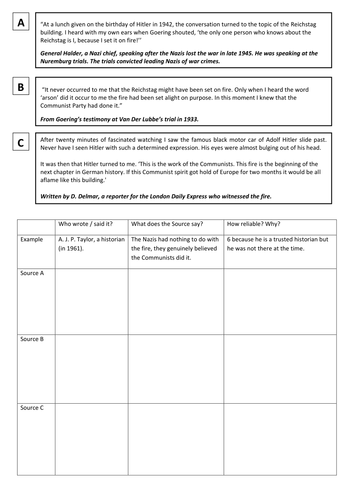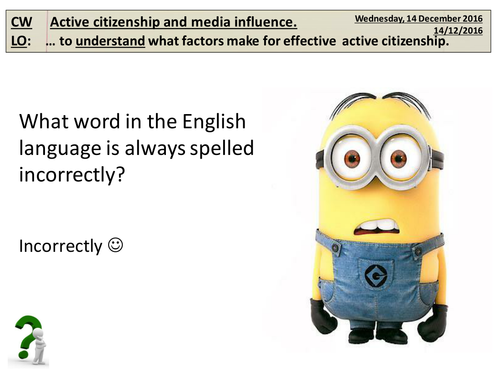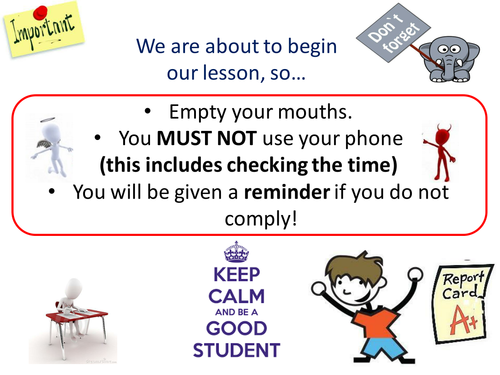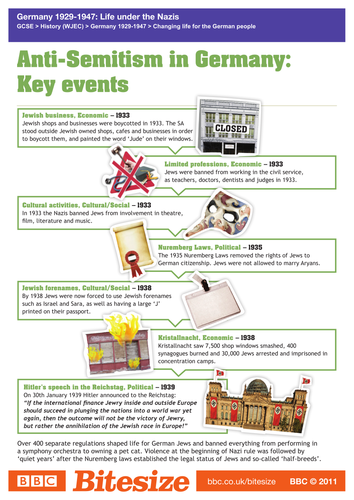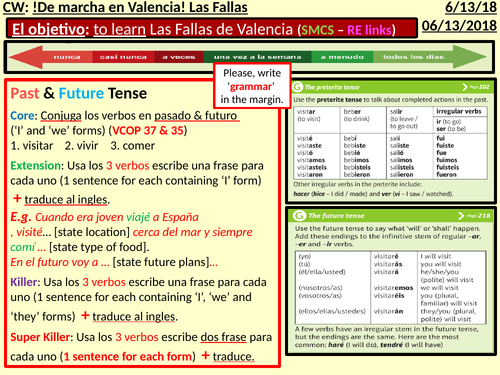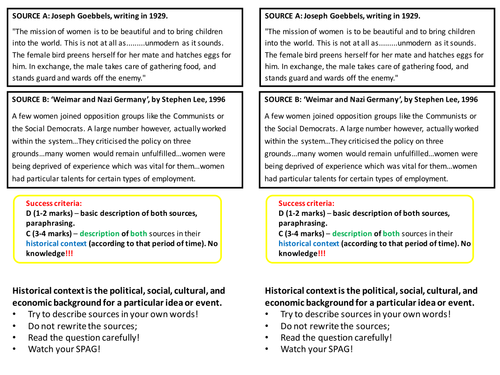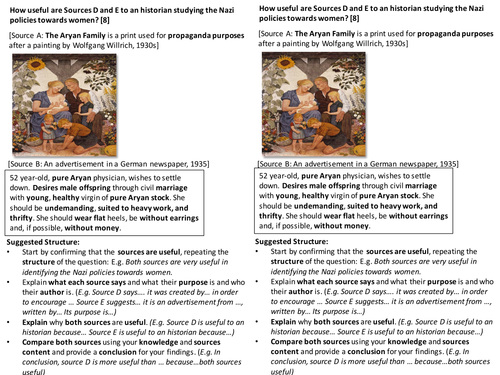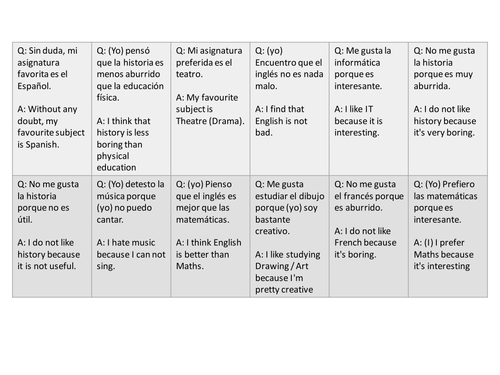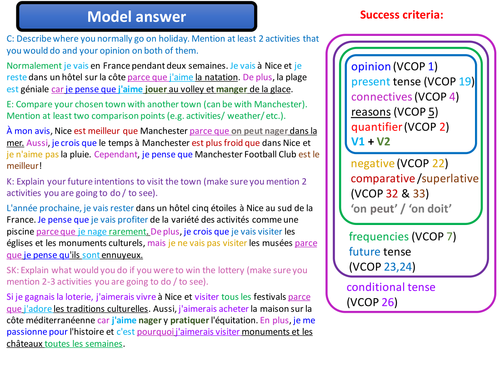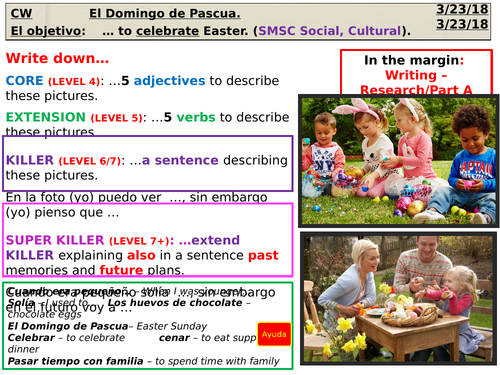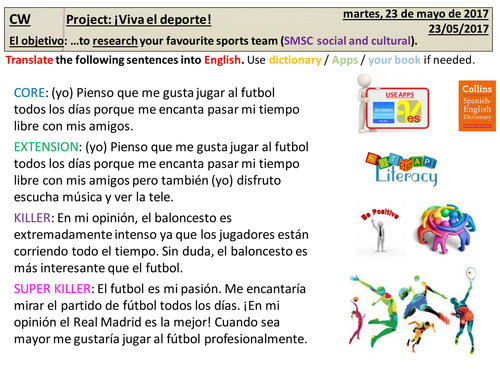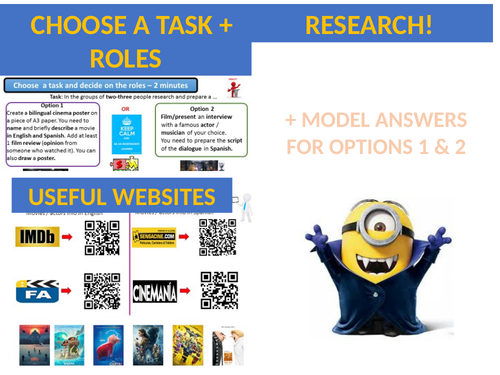
121Uploads
35k+Views
5k+Downloads
All resources

Spanish Festivals: La Tomatina - Spanish KS4 AQA Writing 3
This is the lesson that I have prepared for my y9/y10 in relation to the topic of Spanish culture (Festivals & Celebrations). The lesson starts with the starter about San Fermin Celebration (photo card style) (it was previous lesson title and I always try to link things together) and following review of lesson outcomes we move onto to trying to sing along with Enrique Iglesias (click on the 3d man for the youtube link or search for a YouTube video with lyrics). Students will then recap on SER conjugation in present tense and learn new / revise already known vocabulary on the topic of La Tomatina celebration using Quizlet and Quizlet live online tools. I have then included a video (see link) of Rosa from SpanishPod101 (see their channel in youtube) describing the celebration of La Tomatina. Even though the video is in Spanish and Rosa speaks really quickly, there are subtitles in English so that all students have a chance to listen to a native speaker and at the same time understand what the video is about (note: I personally find the Spanishpod101 videos amazing as they address quite a few cultural / grammar / pronunciation and other aspects so I would recommend letting your students know that a lot of resources are available for free. Consequently, students answer quiz questions about the video and move on to the grammar activity. They revise present tense and then analyse how to form 'Impersonal SE' structures. Then they do a quick test to check understanding and move on to a Writing Section 3 activity (translation from English into Spanish). They self-assess it and play Pictionary. Please note that there is also a handout to make the tasks easier and faster to access. Enjoy!

Free time activities - Spanish - AQA GCSE new spec Part 3 HT - Conversation - Speaking frame
This is the speaking framework that I wrote for the early GCSE classes. The framework was originally designed for them to write an essay that they might use for the speaking test or keep it in file to revise prior to the exam. I have also used it as a writing model answer.
I have left references to the VCOP mat in case someone wants to put their numbers in, alternatively, just delete them as I left the names of the structures.

Research project for KS3/KS4 Spanish - My school
This is a research project lesson (or two lessons really) that I created for my year 9 Spanish students. It can also be used for older students as the model answer has quite a list of grammar / some more can be added. The idea is to promote independent learning via research. There are two choices: a documentary about your school or an interview with between a student from your school and a school in Spain. Students decide on the task, the roles and start researching relevant information using their iPads (one of the students needs to summarise the information that others found). They then have to prepare a script in Spanish and to make a video using iMovie or any other video application. If there is little time I would suggest them to present it and I would film it. The whole process takes about 2 lessons and is perfect for the end of the topic as you can incorporate all of the structures / vocabulary learned during the term!

The Night of the Long Knives
These are two lessons about the Night of the Long Knives. I have included two of them because we actually did both lessons but omitted one of the activities do it is the same in both lessons. Basically pix and mix if you want!
Both lessons include different settlers and starters (WJEC exam questions) and a some information on the SA and the Night of the Long Knives together with analysing its impact and the overview of the Hitler's road from Chancellor to Fuhrer. I sued quite a few videos which I included either amongst the files or by way of establishing a YouTube link.
Please let me know if there are any faults! Enjoy!

Hitler Youth
This is a lesson on the topic of Hitler Youth. It starts with a relaxing settler, then continues onto a scrabble starter (children love it!), Learning outcomes, ask a question (use the table on the slide afterwards to give examples for the questions), an information slide about main youth groups, activity slide (with a link to a video and tasks on the basis of the same) and a revision task not to forget the keywords!

Nazi Police State
This is the lesson on the Nazi Police State. It includes a settler, a starter (Scrabble activity), Learning outcomes slide, information research slide with a structure of the Nazi State (with some tasks organised as CEK plus extension task), source analysis task (oral - describing the Nazi Propaganda poster), exam question based on the same poster (with success criteria and a model answer, peer assessment and SPAG activities) and plenary introducing discussion on Pastor Martin Niemoller's famous quote.

Reichstag Fire
This lesson is about the Reichstag Fire and Enabling Act. You have probably noticed that I like including activities whereby students are researching the topic themselves and revise some of the past themes. This lesson includes a settler, WJEC- style exam question, Peer-Assessment, Ipad Research slide with instructions, a source worksheet (available for free as well because I think I could have used someone's worksheet to create this one), a plenary to revise some dates / events (I used BBC bitesize to prepare this one) a food for thought slide.
As I have said above, I am also including the worksheet in my free resources.

My studies - Spanish - AQA GCSE new spec Part 3 HT - Conversation - Speaking frame + Model answer
This is the speaking framework and the model answer that I wrote for the early GCSE classes. The model answer and the framework were originally designed for them to write an essay that they might use for the speaking test or keep it in file to revise prior to the exam. I have also used it as a writing model answer.
There are three documents in there because I was trying to check what works better and in the end decided that the framework is quite sufficient for them to realise what are they expected to write / say.
I have left references to the VCOP mat in case someone wants to put their numbers in, alternatively, just delete them as I left the names of the structures.

1. Active Citizenship
This lesson was prepared for the year 11 Citizenship students (AQA full course). This lesson is on the topic of Active Citizenship. It includes settler, starter, learning objectives/keywords introduction slide, a quick 'Find Fours' activity to revise some keywords/ key groups, the slide with information on the tactics of pressure group campaigns (methods), a match-up activity to revise some keywords and exam practice materials. The latter is an example of a part B question with a model answer and success criteria, followed up by the self-assessment slide. The presentation ends with a cartoon for a plenary discussion.

3. Rights and Responsibilities in the workplace revision 2016
This lesson was prepared for the year 11 Citizenship students (AQA full course). This lesson is on the topic of Rights and Responsibilities in the workplace. It includes settler, starter, learning objectives/keywords introduction slide, a keywords match-up activity, a 'complete a table' activity on the topic, followed by the answers provided (and there is the possibility to introduce discussion / red pen activity!), some information on discrimination at work and the groups that are usually / might be discriminates (SMSC emphasis) and some exam practice on the questions of the Part B with success criteria, model answers and self-assessment. The presentation ends with a cartoon for a plenary discussion.

Nazi Racial Policy / Antisemitism
This lesson introduces the Nazi Racial policy and touches upon Antisemitism. It includes settler, starter, an example of how an exercise book is supposed to look like (a picture taken from the A* student's book), exam question with a model answer and success criteria, a slide showing how to justify the grade when self-assessing your answer (with a self-assessment slide), Learning outcomes, a slide introducing discussion of the racial policy in the propaganda posters (with some keywords), information research task (I enclosed the information sheet taken from the BBC Bitesize website), Oracy leader task based on the Hitler's quote and a recap activity on the asking students to put the events of the Hitler's rise to power in chronological order.

GCSE Spanish - SMSC / Cultural - Las Fallas - Listening/ Photo Card/ Reading C (AQA)
This is the lesson that I have prepared for my higher y8/ and y9/y10 in relation to the topic of Spanish culture (Festivals & Celebrations). The starter focus is the Past Simple (preterite) and the Future SImple (‘will’). We use Viva books so I included help boxes as a reminder for those who do not clearly remember the endings. Students will then look at the speaking questions of the half-term, analysing them and trying to come up with a set of ideas for a response. I have then included a video (see link) of Rosa from SpanishPod101 (see their channel in youtube) describing the celebration of Las Fallas.
Even though the video is in Spanish and Rosa speaks really quickly, there are subtitles in English so that all students have a chance to listen to a native speaker and at the same time understand what the video is about (note: I personally find the Spanishpod101 videos amazing as they address quite a few cultural / grammar / pronunciation and other aspects so I would recommend letting your students know that a lot of resources are available for free. Consequently, students answer quiz questions about the video. I presented it as a Listening task. They annotated the questions and complete the task using vocabulary help.
Students will then learn new / revise already known vocabulary on the topic of Las Fallas festival using Quizlet and Quizlet live tools. Then they recap on the success criteria for Speaking Q2 / Writing Q1 - Photo card and complete a photo card task based on a photo from La Tomatina celebration together. They jot their thoughts first, play a catchphrase game and then prepare their responses in pairs on the second photo card. Finally they complete a third photo card task individually.
Finally they read and analyse the grammar in the text about festival to complete AQA Higher Reading Section C task (translation). I included some grammar tips for them and highlighted them in the text to make it easier. Then they complete the task, check their answers, self assess themselves and play Hangman (as a reward for hard work!). Enjoy!

Women in Nazi Germany
This lesson is about the women in Nazi Germany. I have also included two printouts for the activities to simplify the completion of the task.
Lesson includes the code starter (with a legend - it is really fun once you know how to quickly create them!), exam question for a starter (see pptx print out attached), model answer for the latter, peer-assessment slide, learning grid activity (you would probably need to print this one out as they can play it as a board game, asking each other question on the topic), a differentiated spider diagram activity based on the video and a 'blind date' activity related to the topic (see docx worksheet which I have taken from elsewhere so it will also be attached in the free uploads). The lesson is finalised by a 'draw and label' plenary activity on Nazi women and a food for thought slide!

How successful were Hitler's social policies?
This lesson is about the success of Hitler's policies regarding childbirth and women. The lesson includes a settler, a starter (exam question), a model answer for the latter featuring success criteria, followed by a peer-assessment slide, learning task grid (better to print it out - you will need some dices as well!), an activity with classifying the statements as successful or not and a slide with an 8 mark exam question (see handout), model answer with success criteria highlighted and a source-analysis plenary task. Finally, I have finished the lesson with a Food for thought slide, as usually.

Opinions on studies - Spanish- AQA (new spec) GCSE Reading (Section A) practice
This is a lesson on opinions ad subjects for a GCSE Spanish class. The lesson includes a literacy (scramble style) starter, a Mini-test on present tense verbs conjugation ( I often give these ones), a quizlet on the words that would be used in the reading task, and a reading task itself. I am trying to teach them how to approach these tasks in the most effective way so they underline the words they know and find out the ones they do not. I wrote the text myself on the basis of the one from the specimen materials for it to have a similar structure to the one they will see in the exam. Finally they self-assess their work (and learn new words!). I also attach a quiz quiz trade that I have prepared for the end of the lesson to revise the previously learned grammar and vocabulary.

Research project (Motivational triggers) for KS3 French - Bon voyage (Holidays) (AQA new spec)
This is a research project lesson (or two lessons really) that I created for my year 7 French students. The writing example can be easily adapted if more structures are to be added. The idea is to promote independent learning via research. Students have to research information about the place that they would like to visit (any place in world really but I encouraged to visit France). Students decide on the task and start researching relevant information about the chosen location using their iPads/ Chromebooks. At the same time they create a poster or a travel brochure with pop-up images (!!!) about the chosen location. During the second lesson they distribute the writing task bullet points in-between the members of the group and complete a piece of writing as per success criteria and model answer. In the end they stick their written notes (or attach them) to their poster /travel brochure. The whole process takes about 2 lessons and is perfect for the end of the topic as you can incorporate all of the structures / vocabulary learned during the term! Note: the writing example is oriented on the revision of tenses studied this year, holidays, weather and location vocabulary. Please let me know if you have any other ideas on how this project can be implemented. If you still have some time left you can enjoy few games I have inserted to simply have fun during the (possibly) last lesson of the year.

El Domingo de Pascua (SMSC - Cultural) Spanish (AQA) KS3/ KS4 lesson
This is an Easter lesson that I created for my higher KS3/KS4 Spanish students. The idea is to have some fun and to do some writing as well!
The lesson starts with a friendly - easy starter, lesson plan and pronunciation slide to learn how to pronounce some Easter related words. Then we move on to a quizlet task to learn / revise some Easter vocabulary and Rally Coach activity to check whether we remember the words (translation practice). I have then included a conjugation activity with some verbs (you need some dices!) followed by a competitive translation activity (make sure you have similar ability students working together). The students then use a trap door structure (table) to speak about their Easter day and then I tell them about my Easter day in a similar manner as suggested by previous activity. I first use pictures only and then show them the model answer and the grammar success criteria. After they write down their responses we move on to playing quizlet live and Hangman. Enjoy!

Research project (Motivational triggers) for KS3 Spanish - Viva el deporte!
This is a research project lesson (or two lessons really) that I created for my year 7 Spanish students. See similar post for early GCSE classes. The writing example can be easily adapted if more structures are to be added. The idea is to promote independent learning via research.Students have to research information about a sports team and create a poster. After that they have to produce a piece of writing to express their opinion on that team. Students decide on the task, the roles and start researching relevant information using their iPads (one of the students needs to summarise the information that others found). The whole process takes about 2 lessons and is perfect for the end of the topic as you can incorporate all of the structures / vocabulary learned during the term!

School Rules - Spanish - AQA new spec -Exam practice (Reading, Section C)
This is a 2b lesson on school rules for a GCSE Spanish class that I happened to have an observation with (unexpectedly!). The lesson includes a literacy starter (students have to find and amend the mistake in the sentence), a mini-plenary on grammar in relation to the starter, a tongue twister slide to practise 'i' sound, a mini-test on present tense verbs conjugation ( I often give these ones), a mini-test on articles, a pronunciation slide and a quizlet on the words that would be used in the reading task, and a reading task itself. I am trying to teach them how to approach these tasks in the most effective way so they underline the words they know and find out the ones they do not. I wrote the text myself on the basis of the one from the specimen materials for it to have a similar structure to the one they will see in the exam. Finally they self-assess their work (and learn new words!). This lesson includes the explanation on how to use 'Spanish Dict Box' application to finds out the meaning of unknown words.

Free time activities - Spanish - AQA GCSE- Project (Motivational triggers) - 1-2 lessons
This is a research project lesson (or two lessons really) that I created for my year 9 Spanish students. It can also be used for older students as the model answer has a list of grammar / some more can be added. The idea is to promote independent learning via research. There are two choices: a bilingual movie poster (I wanted them to practise translating authentic information) about a movie of their choice or an interview with a famous actor/musician. Students decide on the task, the roles and start researching relevant information using their iPads (one of the students needs to summarise the information that others found). Those who chose the second option have to prepare a script in Spanish and if there is enough time, to make a video using iMovie or any other video application. If there is little time I would suggest them to present it and I would film it. The whole process takes about 2 lessons and is perfect for the end of the topic as you can incorporate all of the structures / vocabulary learned during the term!

